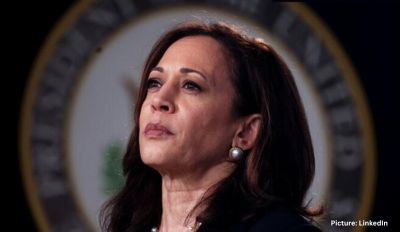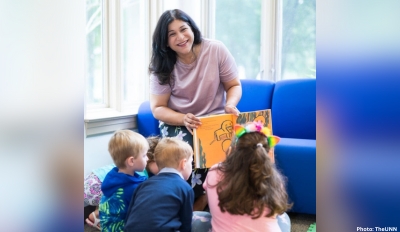Describing India a “geopolitical ally” and “strategic trading partner” of the United States, the just concluded national convention of the Republican Party’s election manifesto has lauded India “for the dynamism of its people and the endurance of their democratic institutions are earning their country a position of leadership not only in Asia but throughout the world,” said the document, called Republican Platform 2016.
Though only a minority of Indian-Americans support the Republican Party, they nevertheless made their presence felt at the 4-day national convention held in Cleveland, Ohio, July 18-21.
Trump won the nomination July 19 evening after each state announced their delegate vote counts, based on primary elections and caucuses. Trump won 1,725 votes; he needed 1,237 to clinch the nomination.
While, an overwhelming majority (65 percent) of Indian-Americans lean Democratic, according to a 2014 Pew Research poll, and only 18 percent lean Republican, the number of delegates who made it to Cleveland, amounts to a significant representation in the GOP. At least 16 Indian-Americans delegates, elected by their local districts and state party officials, made their way to the Republican National Convention. The largest number, 6, were from California and one each from other 8 states.
The Republican platform or the party election manifesto said conflicts in the Middle East have created special political and military challenges for the people of Pakistan. The Republican platform adopted by the party national convention considerably dilutes the rhetoric that fueled presidential candidate Donald J Trump’s primary campaign, and sticks to traditional U.S positions on several key foreign policy issues.
Released on Day 1 of the party convention in Cleveland, the platform calls upon New Delhi to “permit expanded foreign investment and trade, the key to rising living standards for those left out of their country’s energetic economy,” the platform said.
Turning to Pakistan, the platform noted that “conflicts in the Middle East have created special political and military challenges for the people of Pakistan.” The GOP manifesto has called for a beneficial “working relationship” with Pakistan and securing its nuclear arsenal, and came down harsh on China over its military expansion and its “preposterous claim to the entire South China Sea”.
“Our working relationship is necessary, though sometimes difficult, benefit to both, and we look towards the strengthening of historic ties that have frayed under the weight of international conflict,” it said, noting: “This process cannot progress as long as any citizen of Pakistan can be punished for helping the war on terror.”
“Pakistanis, Afghans, and Americans have a common interest in ridding the region of the Taliban and securing Pakistan’s nuclear arsenal,” the document said, adding: “that goal has been undermined by the current (Obama) Administration’s feckless treatment of troop commitments and blatant disregard of advice from commanders on the ground, particularly with regard to Afghanistan.” “A Republican president will work with all regional leaders to restore mutual trust while insisting upon progress against corruption and the narcotic trade that fuels insurgency,” it asserted.
While the customary paragraph on India in the document reflects continuity and stability, and even singles out Indian Americans for praise – “Republicans note with pride the contributions to our country that are made by our fellow citizens of Indian ancestry” – the section on immigration leaves room for concern from an Indian perspective.
In an effort to calm the evangelical constituency of the Republican Party that gets agitated over reports of occasional religious violence against Christians in India, the document says: “For all of India’s religious communities, we urge protection against violence and discrimination,” said the document, which lauded the contributions made to the United States by people of Indian origin.
“America’s immigration policy must serve the national interest of the United States, and the interests of American workers must be protected over the claims of foreign nationals seeking the same jobs,” the party platform said. There is no specific reference to the H 1B visa program in the document, but the argument that foreign workers are taking over American jobs legally is raised frequently in its context.
The Republican Party has officially adopted the controversial Trump proposal to build a wall along the U.S border with Mexico but has watered down the idea of banning non-citizen Muslims from entering the country. “..we support building a wall along our southern border and protecting all ports of entry. The border wall must cover the entirety of the southern border and must be sufficient to stop both vehicular and pedestrian traffic,” it said.
“…we must apply special scrutiny to those foreign nationals seeking to enter the United States from terror-sponsoring countries or from regions associated with Islamic terrorism. This was done successfully after September 11, 2001, under the National Security Entry-Exit Registration System, which should be renewed now,” the platform says.
There were some South Asians who were propped up by the Republican leadership to give the appearance of diversity at the convention. A Sikh-American from California and an At-large Delegate to the convention Harmeet Dhillon, a critic of Trump, who is now toeing party line, gave the invocation in Punjabi on the first day. Pakistani-American Sajid Tarar said a closing prayer on the second day. Businessman Subba Kolla introduced his Virginia delegation and called out the roll-call vote. A 2013 video segment on South Carolina Governor Nikki Haley, a rising star in the Republican Party, was shown on the first day of the convention.
There were some critics of Trump at the convention too. An alternate Delegate, Dr. Sampat Shivangi from Mississippi, who was a Jeb Bush supporter, was reported to have criticized Trump for what he saw as “anti-immigrant, Islamophobic” statements, and lack of political experience. But, “I support Trump with my reservations,” he said.
“I’m still concerned about Trump,” Sudhir Parikh, founder of the Indian American Republican Council, told India-West. “Trump is too anti-immigrant, too anti-minority, and anti-trade. He sticks to his point of view and I’m not sure this represents the views of the Republican Party,” said the New Jersey physician, a prominent fundraiser for the Bush presidential dynasty. “I have not decided yet whether to vote for Trump. I’m not going to sit this election out, but I will wait for four months – until the general election – to see what emerges,” said Parikh, noting that many Republicans will follow conservative commentator Glenn Beck’s call to action and vote for a third party candidate.
Florida cardiologist Zachariah P. Zachariah, who has attended every Republican convention since 1992, told the media that he would not be attending this year. “It’s going to take a while for Trump to unify the party and all the people he’s alienated: Hispanics, Muslims and women,” said the long-time Republican Party fundraiser in an earlier interview with this publication. Former Louisiana Governor Bobby Jindal also did not attend the convention. Jindal was one of 17 Republican presidential candidates during the primary elections, but dropped out last November after consistently-low polling numbers. South Carolina Governor Nikki Haley – a Republican – declined an invitation to speak at the convention. Haley said she would attend the meet, but maintain a low profile.
An Indian-American Republican Party activist and businessman from Illinois, Shalabh ‘Shalli’ Kumar, declared he had donated $898,800 to the Trump campaign. Raj Shah, the director of research and deputy director of communications at the Republican National Committee, authored the insider white paper on how to bring Clinton down, churning out one alleged scandal after another over the past year, climaxing in the anti-Hillary fervor at the Convention. “Obviously it (convention) has got a lot of anti-Hillary messaging which I’ve had a role in,” Shah admitted, “But there’s a lot mixed in. We provide a lot of content that can be drawn upon, and the convention has been a good mixture of those that articulate Hillary Clinton’s weaknesses.
“I would like to see more Indian-American delegates, and would encourage them to get involved locally. It’s a cool experience,” Shah said. Donald Trump, as a businessman and business owner, was an attractive candidate for the community, Shah argued. “His message would resonate with Indian-Americans and I hope they tune in.”


